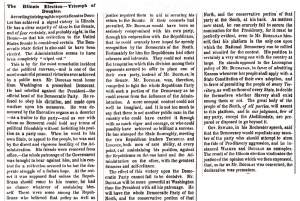Record Data
Transcription
The Illinois Election-Triumph of Douglas.
According to telegraphic reports Senator DOUGLAS has achieved a signal victory in Illinois. He has a clear majority of three in the Senate, and of four certainly, and probably eight, in the House-so that his reelection to the United States Senate is considered certain. The Democratic State ticket is also said to have been elected. The Administration seems to have been completely "wiped out."
This is by far the most remarkable incident of the political canvass,-and is one of the most wonderful personal victories ever achieved by a public man. Mr. DOUGLAS went home from Washington a proscribed Democrat. He had rebelled against the President-the official head of the Democratic Party. He refused to obey his dictation, and made open warfare upon his measures. He was denounced by the Executive organs as deserter-as a traitor to the party-and as one with whom no Democrat could hold any terms of political friendship without forfeiting his position as a party man. When he went to his own State, to appeal to the people, he was met by the direct and vigorous hostility of the Administration. His friends were removed from office,-the whole patronage of the Government was brought to bear against him, and his contest for a reelection seemed to be but the desperate struggle of a forlorn hope. At the outset it was supposed that unless the Republicans should come to his rescue, he had no chance whatever of sustaining himself. There were some among the Republicans who believed that policy as well as justice required them to aid in securing his return to Senate. If their counsels had prevailed, Mr. DOUGLAS would have been so seriously compromised with his own party, through his cooperation with the Republicans, that he could scarcely have hoped for speedy recognition by the Democrats of the South. Fortunately for him the Republicans had other schemes and interests. They could not resist the temptation which this division among their opponents seemed to offer to place one of their own party, instead of Mr. DOUGLAS, in the Senate. Mr. DOUGLAS, was, therefore, compelled to fight the whole Republican Party with such a portion of the Democracy as he could rescue from the influence of the Administration. A more unequal contest could not well be imagined, and it is not too much to say that there is not another public man in the country who could have carried it through with so much vigor and courage, or who could possibly have achieved so brilliant a success.
He has stumped the State thoroughly, meeting the two Republican leaders TRUMBULL and LINCOLN, both men of rare ability, at every point, and maintaining his position, against the Republicans on the one hand, and the Administration on the other, with the greatest firmness and self-reliance.
The effect of this victory upon the Democratic Party cannot fail to be decisive. Mr. DOUGLAS will be more powerful at Washington than the President with all his patronage. He will have the whole Democratic Party of the North, and the conservative portion of that party at the South, at his back. As matters now stand, he can scarcely fail to secure the nomination for the Presidency, for it must be perfectly evident, even to Mr. BUCHANAN himself, that his platform is the only one upon which the National Democracy can be rallied and reunited for the contest. His position is certainly a very strong one with the country at large. He stands opposed to the Lecompton policy of Mr. BUCHANAN, in favor of admitting Kansas whenever her people shall apply with a State Constitution of their adoption, and in favor of permitting the people of ever Territory, as well as those of every State, to decide for themselves whether Slavery shall exist among them or not. The great body of the people of the North, of all parties, will assent to this platform, and in our judgment, few of any party, except the Abolitionists, are prepared or disposed to go beyond it.
GOV. SEWARD, in his Rochester speech, said that the Democracy would repudiate any member of the party who should attempt to stem the tide of Pro-Slavery aggression, and he instanced WALKER and DOUGLAS as examples. The result of the Illinois election vindicates the justice of the opinion which we then expressed, that, so far as Mr. DOUGLAS was concerned, the declaration was premature.








